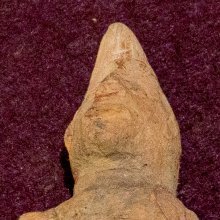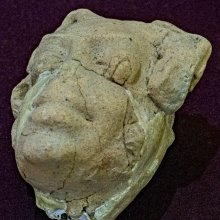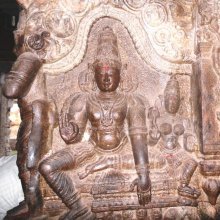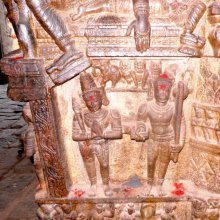Sira, Sīra, Sirā, Śira, Shira: 26 definitions
Introduction:
Sira means something in Hinduism, Sanskrit, Jainism, Prakrit, Buddhism, Pali, the history of ancient India, Marathi, Hindi, biology. If you want to know the exact meaning, history, etymology or English translation of this term then check out the descriptions on this page. Add your comment or reference to a book if you want to contribute to this summary article.
The Sanskrit term Śira can be transliterated into English as Sira or Shira, using the IAST transliteration scheme (?).
Images (photo gallery)
(+181 more images available)
In Hinduism
Ayurveda (science of life)
Nighantu (Synonyms and Characteristics of Drugs and technical terms)
Source: Wisdom Library: Raj Nighantu1) Śirā (शिरा) refers to “fibrous roots” (of trees or plants), as mentioned in a list of five synonyms in the second chapter (dharaṇyādi-varga) of the 13th-century Raj Nighantu or Rājanighaṇṭu (an Ayurvedic encyclopedia). The Dharaṇyādi-varga covers the lands, soil, mountains, jungles and vegetation’s relations between trees [viz., Śirā] and plants and substances, with their various kinds.
2) Śira (शिर) refers to the “end part” of a tree or a creeper , as mentioned in a list of four synonyms, according to the second chapter (dharaṇyādi-varga) verse 32.
Unclassified Ayurveda definitions
Source: Wisdom Library: Āyurveda and botanySirā is a medical term used in Ayurveda meaning "veins".
Source: Wisdom Library: Āyurveda and botany1) Śira (शिर) is a Sanskrit technical term, referring to the “brain”. The term is used throughout Ayurvedic literature such as the Suśruta-saṃhitā and the Caraka-saṃhitā.
2) Sirā (सिरा) is a Sanskrit technical term, referring to “blood vessels” and is used throughout Ayurvedic literature such as the Carakasaṃhitā and the Suśrutasaṃhitā.
Source: archive.org: Sushruta samhita, Volume IIThe Sanskrita term Sirā (सिरा) denotes veins, nerves, arteries and lymphatic vessels as well. Some read Śirā-varna (different colours of the Sirās) in lieu of Sirā-varnana (description of Sirās).
Source: gurumukhi.ru: Ayurveda glossary of termsŚira (शिर):—Head. The site where all Prāṇas and Indriyas are situated. Also is the uppermost and chief part of the body.

Āyurveda (आयुर्वेद, ayurveda) is a branch of Indian science dealing with medicine, herbalism, taxology, anatomy, surgery, alchemy and related topics. Traditional practice of Āyurveda in ancient India dates back to at least the first millenium BC. Literature is commonly written in Sanskrit using various poetic metres.
Dhanurveda (science of warfare)
Source: Wisdom Library: DhanurvedaSīra (सीर) refers to a “plough”. It is a Sanskrit word defined in the Dhanurveda-saṃhitā, which contains a list of no less than 117 weapons. The Dhanurveda-saṃhitā is said to have been composed by the sage Vasiṣṭha, who in turn transmitted it trough a tradition of sages, which can eventually be traced to Śiva and Brahmā.

Dhanurveda (धनुर्वेद) refers to the “knowledge of warfare” and, as an upaveda, is associated with the Ṛgveda. It contains instructions on warfare, archery and ancient Indian martial arts, dating back to the 2nd-3rd millennium BCE.
Yoga (school of philosophy)
Source: ORA: Amanaska (king of all yogas): A Critical Edition and Annotated Translation by Jason BirchSirā (सिरा) refers to the “channels (of the body)”, according to the Amaraughaprabodha: a short 13th century treatise on Yoga attributed to Gorakṣanātha which teaches the fourfold system of yoga (Mantra, Laya, Haṭha and Rāja).—Accordingly, “Some drink urine, their own impurity. Some eat their saliva as food. Some draw up [their] semen that falls from a woman’s vagina after having penetrated [her]. And some who are skilled in circulating the breath through the channels (sirā) of the entire body, consume dhātus. They do not have mastery of the body without [the state of] Rājayoga, in which their minds are absent. When the mind has attained equanimity and the breath moves into the central channel, [then] these Amarolī, Vajrolī and Sahajolī [Mudras] arise”.

Yoga is originally considered a branch of Hindu philosophy (astika), but both ancient and modern Yoga combine the physical, mental and spiritual. Yoga teaches various physical techniques also known as āsanas (postures), used for various purposes (eg., meditation, contemplation, relaxation).
In Jainism
General definition (in Jainism)
Source: The University of Sydney: A study of the Twelve ReflectionsŚira (शिर) refers to “tendons”, according to the 11th century Jñānārṇava, a treatise on Jain Yoga in roughly 2200 Sanskrit verses composed by Śubhacandra.—Accordingly, “Where is the body, which is filled with blood, flesh and fat, has a skeleton of slender bones, is bound with tendons (śira-ānaddha) and is of bad odour, praised? Continually pouring forth putrid smells through [its] nine orifices, the human body is ever perishable [and] dependent on other [things]”.
Synonyms: Snasā.

Jainism is an Indian religion of Dharma whose doctrine revolves around harmlessness (ahimsa) towards every living being. The two major branches (Digambara and Svetambara) of Jainism stimulate self-control (or, shramana, ‘self-reliance’) and spiritual development through a path of peace for the soul to progess to the ultimate goal.
India history and geography
Source: Cologne Digital Sanskrit Dictionaries: Indian Epigraphical GlossarySīrā.—(IA 18), a land measure equal to four halas. See hala. Note: sīrā is defined in the “Indian epigraphical glossary” as it can be found on ancient inscriptions commonly written in Sanskrit, Prakrit or Dravidian languages.

The history of India traces the identification of countries, villages, towns and other regions of India, as well as mythology, zoology, royal dynasties, rulers, tribes, local festivities and traditions and regional languages. Ancient India enjoyed religious freedom and encourages the path of Dharma, a concept common to Buddhism, Hinduism, and Jainism.
Biology (plants and animals)
Source: Google Books: CRC World Dictionary (Regional names)1) Sira in Burkina Faso is the name of a plant defined with Adansonia digitata in various botanical sources. This page contains potential references in Ayurveda, modern medicine, and other folk traditions or local practices It has the synonym Ophelus sitularius Lour. (among others).
2) Sira in India is also identified with Albizia odoratissima It has the synonym Acacia lomatocarpa DC. (etc.).
3) Sira is also identified with Artocarpus integrifolius It has the synonym Artocarpus integrifolia L.f..
4) Sira is also identified with Citrus aurantium It has the synonym Citrus vulgaris Risso (etc.).
Example references for further research on medicinal uses or toxicity (see latin names for full list):
· International Journal of Dermatology (2007)
· Bulletin de la Société Botanique de France (1906)
· Plant Systematics and Evolution (1984)
· Species Plantarum (1753)
· Chem. Pharm. Bull.
· Compt. Rend. Congres Inter. Bot. (1900)
If you are looking for specific details regarding Sira, for example health benefits, pregnancy safety, diet and recipes, side effects, chemical composition, extract dosage, have a look at these references.

This sections includes definitions from the five kingdoms of living things: Animals, Plants, Fungi, Protists and Monera. It will include both the official binomial nomenclature (scientific names usually in Latin) as well as regional spellings and variants.
Languages of India and abroad
Pali-English dictionary
Source: BuddhaSasana: Concise Pali-English Dictionarysira : (m.; nt.) (mano-group) the head. || sirā (f.) a tendon; vein.
Source: Sutta: The Pali Text Society's Pali-English DictionarySira, (nt. and m.) (cp. Vedic śiras, śīan; Av. sarō, Gr. karaρa head, kέras horn, krani/on; Lat. cerebrum; Ohg. hirni brain) head, Nom. siraṃ Th. 2, 255, Acc. siraṃ A. I, 141; siro Sn. 768; sirasaṃ J. V, 434; Instr. sirasā Vin. I, 4; D. I, 126; Sn. 1027; Loc. sirasmiṃ M. I, 32; sire DA. I, 97; in compounds siro- A. I, 138.—sirasā paṭiggaṇhāti to accept with reverence J. I, 65; pādesu sirasā nipatati to bow one’s head to another’s feet, to salute respectfully Vin. I, 4, 34; Sn. p. 15, p. 101. siraṃ muñcati to loosen the hair J. V, 434; cp. I. 47; mutta° with loose hair KhA 120=Vism. 415; adho-siraṃ with bowed head, head down A. I, 141; IV, 133; J. VI, 298; cp. avaṃ°; dvedhā° with broken head J. V, 206; muṇḍa° a shaven head DhA. II, 125. (Page 711)
— or —
Sirā, (Sk. sirā) (f.) a bloodvessel, vein Mhvs 37, 136; nerve, tendon, gut J. V, 344, 364; °-jāla the network of veins J. V, 69; PvA. 68. (Page 711)
— or —
Sīra, (Vedic sīra) plough ThA. 270 (=naṅgala). (Page 712)

Pali is the language of the Tipiṭaka, which is the sacred canon of Theravāda Buddhism and contains much of the Buddha’s speech. Closeley related to Sanskrit, both languages are used interchangeably between religions.
Marathi-English dictionary
Source: DDSA: The Molesworth Marathi and English Dictionaryśira (शिर).—n (S) The head. 2 The crop or top of a tree. 3 The van of an army. 4 śira or śīra is used, like the word rāsa q. v., in the sense A head or an individual, in expressing the number of a body of horses; as ghōḍā śīra cāra. śira surī tujhyā hātīṃ (My &c.) life awaits your disposal. śira hātāvara ghēṇēṃ To take one's head in one's hand; to be heroically daring: also to be reckless of life. See Judges xii. 3; 1 Sam. xix. 5, xxviii. 21. śirātōrā or śirāturā asaṇēṃ g. of s. To possess superiority over or in. śirāṃ tōrā or -turā lāvaṇēṃ -dākhaviṇēṃ -miraviṇēṃ To put a plume upon one's head. Hence To assert superiority or preeminence. śirīṃ On the head of, i. e. at the very moment of; as lagnācyā śirīṃ, prasaṅgācyā śirīṃ kāmācyā śirīṃ. śirīṃ asaṇēṃ To be at or over (as a protector or keeper of) the head of. See 1 Sam. xxviii. 2. Ex. śirīṃ asatāṃ paṇḍharīnātha || cintā kimapi na karāvī ||.
--- OR ---
śira (शिर).—ind The sound uttered in driving off a cat.
--- OR ---
śirā (शिरा).—f (S) Any vessel of the body really, or supposed to be, tubular; as an artery or a vein, a nerve, a tendon or sinew, a muscle or fibre, a bowel or gut. See the popular form śīra.
--- OR ---
śirā (शिरा).—m ( P) Sirup, sugar boiling in order to be candied: also juice of fruits, essence of herbs, roots &c. obtained by decoction, a vegetable extract. rob. 2 A certain sweetmeat.
--- OR ---
śirā (शिरा).—m ( H Extremity or end.) The border or boundary (of a field, village, hill &c.)
--- OR ---
śirā (शिरा).—a ind Excellent, capital, fine, superior, superlatively good. A very popular word.
--- OR ---
śīra (शीर).—f (śirā S) A vein or an artery: also a muscle or fibre: any vessel of the body (really or as supposed to be) tubular; a nerve, a tendon or sinew, a bowel or gut. 2 A vein or fibre (of a leaf, cocoanut, or other fruit): also a streak resembling it in wood or stone: also, hence, the edge of a plank, post, or piece of timber. śirā ghēṇēṃ To undergo venesection. śirā or śīra ghēṇēṃ -kāḍhaṇēṃ -tōḍaṇēṃ -dēṇēṃ To open veins or a vein; to perform venesection. śirā tānaṇēṃ or śirā tānūna ōraḍaṇēṃ -bōlaṇēṃ -bhāṇḍaṇēṃ -raḍaṇēṃ -vāda karaṇēṃ &c. To call -speak -quarrel or dispute -cry or wail -argue &c. loudly or with vehement straining or effort. śirā or śīra tōḍaṇēṃ To hough or hamstring (a horse &c.) śirā nighaṇēṃ g. of s. To have one's veins standing out conspicuously; i. e. to be lean and gaunt. śirā phugaviṇēṃ To puff and pout (in high dudgeon or anger). śīra phuṭaṇēṃ in. con., as mhaśīlā, gāyīlā, ghōḍīlā, bāyakōlā, To have one's milk set a flowing. 2 (as ghōḍyālā, pōrālā) To begin to grow vigorously.
--- OR ---
śīra (शीर).—f n C A platted half-branch of a Cocoanut.
--- OR ---
śīra (शीर).—n (śira S through H) The head. Pr. śīra salāmata tō pagaḍyā pacāsa. For phrases and compounds see under śira. Note. The compounds śīrakhaṇḍa, śīragōmī, śīraṭōpa, śīraphōḍyā &c., as compounded with śīra, should be written thus and be inserted in order here, but, as popularly confounded with the compounds with śira S and with P, and therefore ordinarily written śira- khaṇḍa, śiragōmī &c., they appear so written and in order under śira.
Source: DDSA: The Aryabhusan school dictionary, Marathi-Englishśira (शिर).—n The head. The top of a tree. The van of an army. śira surī tujhyā hātī (My, &c.) life awaits your disposal. śira hātāṃvara ghēṇēṃ. Take one's head in one's hand; be reckless of life. śirīṃ On the head of, i. e. at the very moment of. Ex. prasaṅgācyā śirīṃ. śirī asaṇēṃ Be at or over the head of.
--- OR ---
śirā (शिरा).—m Syrup. A sweetmeat. f A vein. a Excellent.
--- OR ---
śīra (शीर).—n The head. f A vein. A fibre. śirā ghēṇēṃ Undergo venesection. śirā ghēṇēṃ-kāḍhaṇēṃ Perform venesection. śirā tāṇaṇēṃ or śirā tāṇūna ōraḍaṇēṃ-bōlaṇēṃ-bhāṇḍaṇēṃ Call, speak, quarrel or dispute loudly or with vehement straining or effort. śirā phugaviṇēṃ To puff and pout (in anger).
Marathi is an Indo-European language having over 70 million native speakers people in (predominantly) Maharashtra India. Marathi, like many other Indo-Aryan languages, evolved from early forms of Prakrit, which itself is a subset of Sanskrit, one of the most ancient languages of the world.
Sanskrit dictionary
Source: DDSA: The practical Sanskrit-English dictionaryŚira (शिर).—1 The head.
2) The root of the pepper plant (m. also according to some, in these senses).
-raḥ 1 A bed.
2) A large serpent.
Derivable forms: śiram (शिरम्).
--- OR ---
Śirā (शिरा).—Any tublar vessel of the body, a nerve, vein, artery, blood-vessel.
--- OR ---
Śīra (शीर).—[śīṅ-rak Uṇādi-sūtra 2.13] A large snake; see सीर (sīra) also.
Derivable forms: śīraḥ (शीरः).
--- OR ---
Sira (सिर).—The root of long pepper.
Derivable forms: siraḥ (सिरः).
--- OR ---
Sirā (सिरा).—
1) Any tubular vessel of the body (as a vein, artery, nerve &c.).
2) A bucket, baling vessel.
3) Ved. A stream; त्वं वृत्रमाशयानं सिरासु महो वज्रेण सिष्वपो वराहुम् (tvaṃ vṛtramāśayānaṃ sirāsu maho vajreṇa siṣvapo varāhum) Ṛ.v.1.121.11.
--- OR ---
Sīra (सीर).—[si-rak pṛṣo° Uṇādi-sūtra 2.25]
1) A plough; सीरभेदैः कृषिः प्रोक्ता मन्वाद्यैर्ब्राह्मणादिषु (sīrabhedaiḥ kṛṣiḥ proktā manvādyairbrāhmaṇādiṣu) Śukra.4.26; सद्यः सीरोत्कषण- सुरभि क्षेत्रमारुह्य मालम् (sadyaḥ sīrotkaṣaṇa- surabhi kṣetramāruhya mālam) Meghadūta 16.
2) The sun.
3) The Arka plant.
Derivable forms: sīraḥ (सीरः).
Source: Cologne Digital Sanskrit Dictionaries: Edgerton Buddhist Hybrid Sanskrit DictionarySīra (सीर).—[, n. pl. sīrāḥ, error for sītāḥ, furrows, to Sanskrit sītā: (sa yadaikaṃ) halasīraṃ (q.v.) kṛṣati tadā sapta sīrāḥ (read sītāḥ) kṛṣṭā bhavanti Divyāvadāna 124.7, and similarly 134.7, when he drew (plowed with) a single plow(-share), then seven furrows were plowed (by magic power). Proved by Pali Vin. i.240.18—19 ekena naṅgalena kasantassa satta sītāyo gacchanti.Corruption due to preceding (hala-) sīraṃ.]
Source: Cologne Digital Sanskrit Dictionaries: Shabda-Sagara Sanskrit-English DictionaryŚira (शिर).—n.
(-raṃ) 1. The head. 2. The root of the pepper plant. f.
(-rā) Any vessel of the body, really or supposed to be, of a tubular form, as a nerve, a tendon, a gut, &c. m.
(-raḥ) 1. A bed. 2. A large serpent. E. śṝ to injure, ka aff.: see śiras .
--- OR ---
Śīra (शीर).—m.
(-raḥ) A large snake, (Boa constrictor.) 2. A plough. E. śī to sleep, rak Unadi aff.
--- OR ---
Sira (सिर).—m.
(-raḥ) The root of long-pepper. f.
(-rā) 1. Any tubular vessel of the body, or one so considered, as a nerve, a vein, an artery, a tendon, &c. 2. A bucket. E. ṣi to bind, aff. rak, form irr.; also śira .
--- OR ---
Sīra (सीर).—m.
(-raḥ) 1. A plough. 2. The sun. 3. The Arka plant. E. ṣi to bind, Unadi aff. ran, and the vowel made long; also śīra .
Source: Cologne Digital Sanskrit Dictionaries: Benfey Sanskrit-English DictionaryŚira (शिर).—I. i. e. curtailed śiras, n. 1. The head. 2. The root of the pepper plant. Ii. f. rā (cf. sirā), Any vessel of the body, really, or supposed to be of a tubular form, as a nerve, [Rāmāyaṇa] 5, 32, 11; a vein.
--- OR ---
Śīra (शीर).—[śī + ra], m. A snake, boa-constrictor, [Pañcatantra] 203, 6.
--- OR ---
Sira (सिर).— (vb. si ?), I. m. The root of long pepper. Ii. f. rā. 1. Any tubular vessel of the body, as a vein, a nerve, [Suśruta] 1, 267, 13. 2. A bucket a baling vessel.
--- OR ---
Sīra (सीर).— (vb. si, cf. sītā), m. 1. A plough, [Meghadūta, (ed. Gildemeister.)] 16. 2. The sun.
Source: Cologne Digital Sanskrit Dictionaries: Cappeller Sanskrit-English DictionaryŚīra (शीर).—[adjective] sharp, pointed; [masculine] boa.
--- OR ---
Sirā (सिरा).—[feminine] stream, channel; vein, artery.
--- OR ---
Sīra (सीर).—[neuter] [masculine] plough; [masculine] plough-ox.
--- OR ---
Sīrā (सीरा).—[feminine] stream.
Source: Cologne Digital Sanskrit Dictionaries: Monier-Williams Sanskrit-English Dictionary1) Śira (शिर):—[from śiras] 1. śira m. = śiras, the head, [Mahābhārata; Pañcarātra] etc.
2) [v.s. ...] the root of Piper Longum, [cf. Lexicographers, esp. such as amarasiṃha, halāyudha, hemacandra, etc.] ([varia lectio] sira)
3) [v.s. ...] Betula Bhojpatra, [cf. Lexicographers, esp. such as amarasiṃha, halāyudha, hemacandra, etc.]
4) [v.s. ...] a Boa, [cf. Lexicographers, esp. such as amarasiṃha, halāyudha, hemacandra, etc.]
5) [v.s. ...] a bed, couch, [cf. Lexicographers, esp. such as amarasiṃha, halāyudha, hemacandra, etc.]
6) [from śiras] 2. śira in [compound] for śiras.
7) Śirā (शिरा):—śirāla See sirā, sirāla.
8) Śīra (शीर):—1. śīra mfn. ([from] √śo) pointed, sharp, [Ṛg-veda]
9) m. a large snake, the Boa Constrictor, [Pañcatantra]
10) 2. śīra śīra-deva etc. See sīra.
11) Sira (सिर):—m. = śira1, the root of Piper Longum, [cf. Lexicographers, esp. such as amarasiṃha, halāyudha, hemacandra, etc.]
12) Sirā (सिरा):—f. ([from] √sṛ) a stream, water, [Ṛg-veda i, 121] (cf. [Naighaṇṭuka, commented on by Yāska i, 12]; often written śirā)
13) any tubular vessel of the body, a nerve, vein, artery, tendon etc., [Suśruta; Yājñavalkya; Mahābhārata] etc.
14) a vein-like channel or narrow stream of river water, [Varāha-mihira’s Bṛhat-saṃhitā]
15) lines which cross each other like veins, [ib.]
16) a bucket, baling-vessel, [cf. Lexicographers, esp. such as amarasiṃha, halāyudha, hemacandra, etc.]
17) Sīra (सीर):—mn. (for derivation See sītā) a plough, [Ṛg-veda] etc. etc.
18) m. an ox for ploughing, draught-ox, [Kauśika-sūtra]
19) the sun, [Nirukta, by Yāska ix, 40]
20) Calotropis Gigantea, [cf. Lexicographers, esp. such as amarasiṃha, halāyudha, hemacandra, etc.]
Source: Cologne Digital Sanskrit Dictionaries: Yates Sanskrit-English Dictionary1) Śira (शिर):—(raṃ) 1. n. The head; root of the pepper plant. 1. f. Any tubular vessel of the body.
2) Śīra (शीर):—(raḥ) 1. m. A large snake, Boa.
3) Sira (सिर):—(raḥ) 1. m. The root of longpepper. f. Any tubular vessel of the body, as a vein, &c.; a bucket.
4) Sīra (सीर):—(raḥ) 1. m. A plough; the sun.
Source: DDSA: Paia-sadda-mahannavo; a comprehensive Prakrit Hindi dictionary (S)Śirā (शिरा) in the Sanskrit language is related to the Prakrit words: Chirā, Sirā, Sīra.
[Sanskrit to German]
Sanskrit, also spelled संस्कृतम् (saṃskṛtam), is an ancient language of India commonly seen as the grandmother of the Indo-European language family (even English!). Closely allied with Prakrit and Pali, Sanskrit is more exhaustive in both grammar and terms and has the most extensive collection of literature in the world, greatly surpassing its sister-languages Greek and Latin.
Hindi dictionary
Source: DDSA: A practical Hindi-English dictionary1) Śira (शिर) [Also spelled shir]:—(nm) the head; -[vyavaccheda/vyavacchedana] beheading, chopping off the head; ~[strāṇa] headwear, head-dress.
2) Śirā (शिरा):—(nf) a vein; -[jāla] veinous system.
3) Śīra (शीर) [Also spelled shir]:—(nm) a python; milk; ~[ra-śakara] milk and sugar; [ho jānā] to get inseparably intermixed (like milk and sugar), to develop extreme intimacy, to become one with each other.
4) Śīrā (शीरा):—(nm) syrup; molasses.
5) Sira (सिर) [Also spelled sir]:—(nm) head; top, apex; highest part or point; ~[kaṭā] beheaded, headless, decapitated; ~[khapāī] (the process of) taxing one’s brain over-much; too much of mental exertion; ~[caḍhā] cheeky, given too much of lift; ~[tāja] (lit. and fig.) crown, the best (amongst); diadem; chief; master, husband; ~[trāṇa] a headwear; ~[nāmā] form of address (in a letter etc.); ~[peca] a typical turban; an ornament fixed on the turban; ~[muṃḍā] having a cleanshaven head; ~[maura] see ~[tāja; ~hānā] headrest; the upper end of a bedstead; —[alaga karanā] to behead, to chop off the head; —[ānā, ke] to possess, to obsess; to be charged with; —[āṃkhoṃ para] with one’s heart and soul; most willingly, most cordially; —[āṃkhoṃ para biṭhānā/rakhanā] to give a most cordial and affectionate treatment; —[āṃkhoṃ para honā] to be deferentially welcome;. to be obeyed with reverence; —[uṭhākara calanā] to hold one’s head high, to have nothing to be ashamed of, to walk proudly/conceitedly, to look big; to strut; —[uṭhāte hī kucala ḍālanā/denā] to nip in the bud, to crush in the egg; —[uṭhānā] to rise in revolt, to rebel; —[uṭhāne kī phurasata na honā] not to have a moment’s respite; —[uḍa jānā] to be beheaded, the head to be chopped off; —[uḍā denā] to behead, to chop off the head; —[utāranā] to behead; —[ūṃcā karanā]to hold one’s head high, to be proud (of), to feel a sense of pride; —[kadamoṃ para rakhanā] to bow in obeisance; to make a complete surrender; —[kalama karanā] to behead, to chop off the head; —[kahāṃ phoḍūṃ]? where to seek ?, where to find ?, where to go ?; —[kā na pāṃva kā] having neither beginning nor end, absurd; —[kā pasīnā pāṃva ko ānā] to work assiduously; to perspire profusely; —[kā bojha utaranā] to be freed of a burden; to fulfil an obligation; —[kā bojha ṭālanā] to finish, with an assignment, to see a thing through somehow or the other; —[kā bavāla honā] to be a headache, to be a source of botheration; —[kī āphata ṭalanā] to be rid of a headache/botheration; —[kī kasama] lit. by the head—I swear by my life !; —[kī ṭalī jāna para āī] spared by one calamity, attacked by another; —[kī sudha na pāṃva kī budha] to be out of senses, to be conscious neither of self nor of surroundings; —[ke bala] headlong; with due deference; —[ke sātha honā] to be with one’s life, to last as long as life lasts; —[kore ustare/chure se mūṃḍanā] to fleece ruthlessy; —[khapānā] to beat one’s brains, to tax one’s brain, to exert; —[khānā] to pester, to plague, to go on bothering; —[khālī karanā] to over-tax one’s brain; to chatter somebody’s brain out; —[khujalānā] to be in for a beating/thrashing; —[khujalāne/khujāne kī phurasata/muhalata na honā] to be up to the elbows, to be up to the eyes in the work, to have one’s hands full, to have not even breathing respite; —[kholanā] to break somebody’s skull; -[gaṃjā kara denā, māra mārakara] to thrash someone bald; to give a sound beating; —[girānā] to behead; —[ghuṭanoṃ meṃ denā] to be gloomy/glum; to bow the head in shame; —[ghūmanā] to feel giddy, to suffer from vertigo; —[cakarānā] see —[ghūmanā; —caḍhanā] to take too much liberty; to take much lift; —[caḍhakara bolanā] the cat to jump out of the bag, the secret to be exposed by itself; to gab through obsession; —[caḍhakara bole, jādū vaha jo] a spell must somehow procure a tangible expression; —[caḍhanā] to become too cheeky, to take too much liberty; —[caḍhānā] to spoil (as a child/servant etc.) by indulgence; to make too much of; —[cāṭanā] to go on pestering, to tax one’s brain, to plague; —[jānā] to lose one’s life; (a responsibility etc.) to devolve on; —[jhukanā] to feel ashamed, to hang the head (in shame); —[jhukākara sajā bhoganā] to kiss the rod; —[jhukānā] to bow the head (in saltation); to look down through shame; to acquiesce; —[ṭakarākara mara jānā] to make desperate bids in vain; to meet a sad end in frustration —[ṭakarānā] to dash the head against; to suffer too much of mental exertion; —[ḍālanā] to impose upon, to cause (a responsibility etc.) to devolve (on); —[tarāśanā] to behead; to chop off the head; ~[toḍa kośiśa karanā] to make a frantic/desperate bid; —[thāma kara baiṭha jānā] lit. to sit with the head resting on the hands—to suffer a stroke of ill-luck; —[thāma lenā] to hold the head (as expressive of having suffered a tragic blow); —[thopanā] to impose (upon); to accuse; —[dukhanā] to suffer from headache; —[denā] to stake one’s life, to die (for); —[dhaḍa kī bājī lagānā] to burn one’s boats; —[dhunanā] to beat the head as a mark of mourning; to weep and wail aloud; —[na uṭhāne denā] to allow no respite, to keep thoroughly engaged; to give no lift/quarter; to give no opportunity to rise against; —[na pāṃva/paira] groundless, having no logic whatever, absolute absurdity; —[navānā] to bow one’s head (in obeisance); —[nahīṃ uṭhā sakanā] too burdened with somebody’s acts of grace to claim equal footing; to be too busy; —[nīcā karanā] to inflict a defeat; to cause embarrassment; to hang one’s head in shame; —[nīcā honā] to suffer a defeat; to feel embarrassed/ashamed; —[pakaḍakara baiṭhanā] see —[thāma kara baiṭha jānā; —pakaḍa kara raha jānā] to be stunned still by grief; —[pakaḍa kara ronā] to bemoan, to weep and wail; —[paṭakanā] to make frantic efforts; to mourn, to weep and wail; —[paḍanā] to be obliged to shoulder (a responsibility etc.); to be imposed on; to have (an obligation etc.) devolved on; —[paḍī balā jhelanā] to hold the baby; —[paḍe kā saudā] a matter with no alternative; to have to undertake per force, to be obliged to take up; —[para] on the head, close at hand; —[para ahasāna rakhanā] to make someone grateful, to impose a burden of gratitude; —[para āṃkheṃ na honā] to be mentally blind, to be unheeding; —[para ā jānā] to approach very near; to be imminent; to be face to face with; to devolve on; —[para (āsamāna/ghara) uṭhānā] to create a havoc; to cause an uproar; to kick up a row; —[para āsamāna ṭūṭanā] to be in the grip of a terrible affliction, a calamity to befall; —[para kaphana bāṃdhanā] to risk one’s life, to hold one’s life in one’s hand; —[para kayāmata ṭūṭanā] a great calamity to befall, to be in the grip of a terrible affliction; —[para kayāmata barapā karanā] to cause a calamity to befall, to create a havoc; to cause an uproar; —[para kālī haṃḍiyā rakhanā] to feel ashamed; —[para kurāna uṭhānā] to swear by the Qoran; —[para kurāna rakhanā] to bind by an oath of the Qoran; —[para koī na honā] to have none to guide or to provide protection; —[para kodoṃ dalanā] to deliberately offend somebody, to do a thing merely to arouse jealousy; —[para khaḍā honā] to hang or hover around; to pester by persistent presence; —[para khāka uḍanā/ḍālanā] to mourn; —[para khūna caḍhanā yā savāra honā] to be overwhelmed by murder—mania; to see things bloodshot; —[para ghara uṭhā lenā] to cause a tremendous uproar; to kick up a row; —[para caḍhanā] to behave with extreme rudeness (said of children or inferiors); —[para caḍhānā] to spoil (as a child) through indulgence; to pamper a bit too much; to encourage into insolence; —[para chata uṭhā lenā] see —[para ghara uṭhā lenā; para junūna caḍhanā] to go crazy; to stick crazily to an obstinate resolve; —[para jina caḍhanā] see —[para bhūta savāra honā; —para ḍālanā] to shift a botheration; to put a responsibility over; —[para ḍhola bajānā] to cause a tumultuous scene, to create too much of noise; —[para paḍanā] (a responsibility etc.) to devolve upon/to have to be shouldered; —[para pāṃva rakhakara bhāganā yā uḍa jānā] to take to one’s heels, to show a clean pair of heels; —[para bananā] to be in hot waters, to be in trouble, to be confronted with an affliction; —[para biṭhānā/baiṭhānā] to extend respectful welcome, to receive with deference; —[para bojha lenā] to take up/shoulder a responsibility; —[para bhūta savāra honā] to be under an obsession, to turn into a maniac; to go crazy through an obstinate resolve; —[para mauta khelanā] death to hover around, to face a hazard to life; to be in close proximity with death; —[para rakhanā] to treat with great respect, to revere; —[para lādakara le jānā] to carry along (to the next world); —[para lādanā] to carry over the head; to entrust a burden (to), to cause (an obligation etc.) to devolve upon; —[para lie phiranā] to carry around over the head, to run about with a burden; —[para le jānā] to carry over one’s head; to cause to be transported on one’s responsibility; —[para lenā] to accept the responsibility, to own a responsibility; —[para vāranā] to sacrifice on (somebody), to revolve (a coin etc.) round a dear one’s head and then gift it away; —[para śaitāna caḍhanā/savāra honā] to be overwhelmed by sinful mentality/evil; to be obsessed by a sense of anger/obstinacy; —[para sa(śa)nīcara savāra honā] to be in adversity, to be under the sway of ominous stars; —[para saphedī ānā] to go grey; —[para savāra rahanā] to ever hover around; to keep under constant watch; to behave in an insolent manner, to keep on bullying; to keep under obsession; —[para savāra honā] to bully, to behave insolently; —[para sāyā rakhanā] to provide constant protection to; —[para sāyā rahanā/honā] to enjoy the shadow of a protective hand, to be under the protection of; —[para sīṃga honā] to have some abnormal characteristic, to have a distinctive feature; —[para seharā bāṃdhanā] to earn a distinction; to be plumed; —[para hātha dhara kara ronā] to lament, to bewail; —[para hātha dharanā] to take under one’s protection/patronage; —[para hātha pheranā] to fondle; to console; —[para honā] to be imminent, to be near at hand; to be over and above, to be on the back; —[pāṃva na honā] or —[paira na honā] to make no head or tail, to make no sense; to be absurd, to be ridiculously illogical/incoherent; —[pāṃva para dharanā] to yield completely, to be submissive in the extreme; —[pīṭanā] to lament with a violent beating of the head, to be full of remorse; —[pīṭa kara ronā] to lament violently, to weep and wail; —[paira honā] to be rational/logical, to make some sense; —[phaṭā jānā/paḍanā] the head to crack with pain, to have severe headache; —[phiranā] to go crazy, to run amuck; to be out of seuses; to go to one’s head; ~[phirā] crazy, eccentric; —•[honā] to have bats in the belfry; —[bāṃdhanā] to tie up the hair, to plait or braid the hair; —[bītanā, kisī ke] to suffer, to undergo an ordeal; —[becanā] to own up a hazard to life: —[bhannānā] see —[bhinnānā; bhārī honā] to have headache; to have a heaviness in the head; —[bhinnānā] to feel giddy, to suffer from vertigo; to have a fit of anger; —[maṭakānā] to nod the head ironically; —[meṃḍhanā] to pass the buck to, to make a dupe of a person, to lay at the door of, to thrust on, to impose on (an obligation, accusation, etc.); —[māranā] to tax one’s brain, to try to explain something to a nitwit, to make strenuous efforts, to try no end, to take great pains; —[muṃḍavā denā] to get the head shaven; —[muṃḍāte hī ole paḍanā] to be confronted with obstacles at the very first step, ill-luck to overtake at the very outset; —[muṃḍānā] lit. to have the head shaven—to adopt the life of a mendicant, to turn an ascetic; —[raṃganā] to make one’s head bleed, to break somebody’s head; —[laganā] to be accused, to be faced with an accusation; —[lenā] to own up, to undertake a responsibility; —[se kaphana bāṃdhanā] to be ready to face death, to stake one’s life; —[se (balā) ṭālanā] to get rid of a botheration; to be done with; —[se tinakā utārane kā ahasāna mānanā] to be grateful even for the semblance of a good turn; —[seharā baṃdhanā] to get the credit for (a success etc.), to get applause for an achievement; —[sahalāe bhejā khāe] to cause a jam and apply the balm, —[sirahāne yā paitāne kamara vahḹṃ rahegī] as broad as it is long, one way or the other would bring about the same result; —[se paira taka] chin deep, up to the chin; —[se paira/pāṃva taka] from head to foot; •[āga laganā] to be furious with rage; —[se pānī ūpara honā/gujaranā] all bounds, to be crossed, to become just intolerable; —[se paira taka (laisa)] cap-a-pie; —[se balā ṭālanā] to get rid of an unpleasant context, to be done with somehow; —[se bojha utāranā] to rid oneself of a burden; —[se bojha bāṃdhanā] to own up an obligation; —[se sāyā uṭhanā] to be deprived of a benevolent hand, a patron/protector to be no more; —[hathelī para dharanā/rakhanā] to be ever-ready to face death, to be never scared of death: —[hājira hai] to be ready to risk life with pleasure, to be ready to take up a risk; —[hilānā] to nod the head (to express approval or disapproval); —[honā] to go on pestering; —[honā, kisī ke] (responsibility, accusation etc.) tc devolve on, to be shouldered by.
6) Sirā (सिरा):—(nm) an edge; end; head, top; ~[re] extremities, ends; ~[re se, (naye)] anew, afresh, de novo.
7) Sīra (सीर) [Also spelled seer]:—(nf) self cultivated land; (nm) a plough; —[karanā] to self-cultivate; —[meṃ honā] to be under cultivation
8) Sīrā (सीरा):—(nm) molasses.
...
Prakrit-English dictionary
Source: DDSA: Paia-sadda-mahannavo; a comprehensive Prakrit Hindi dictionary1) Sira (सिर) in the Prakrit language is related to the Sanskrit word: Sṛj.
2) Sira (सिर) also relates to the Sanskrit word: Śiras.
3) Sirā (सिरा) also relates to the Sanskrit words: Śirā, Sirā.
4) Sīra (सीर) also relates to the Sanskrit word: Sīra.
Prakrit is an ancient language closely associated with both Pali and Sanskrit. Jain literature is often composed in this language or sub-dialects, such as the Agamas and their commentaries which are written in Ardhamagadhi and Maharashtri Prakrit. The earliest extant texts can be dated to as early as the 4th century BCE although core portions might be older.
Kannada-English dictionary
Source: Alar: Kannada-English corpusŚira (ಶಿರ):—
1) [noun] any blood vessel that carries blood from some part of the body back toward the heart; a vein.
2) [noun] any natural combination of minerals, from which a metal or metals can be extracted; an oar.
--- OR ---
Śira (ಶಿರ):—
1) [noun] the part of the body, in humans, above the neck or corresponding part in other animals; the head.
2) [noun] the front portion (of anything); top; summit; pinnacle; acme.
3) [noun] the top of a tree.
4) [noun] the root of a pepper plant.
5) [noun] a kind of large serpent.
6) [noun] ಶಿರದೊಳಾನ್ [shiradolan] śiradoḷān to carry out (an order, command, instruction) faithfully and obidiently.
--- OR ---
Śira (ಶಿರ):—[noun] = ಶಿರಾ [shira].
--- OR ---
Śirā (ಶಿರಾ):—[noun] a kind of sweet-meat, made using grit-like flour of wheat, ghee, etc.
--- OR ---
Sira (ಸಿರ):—[noun] the part of the body, in humans, above the neck or corresponding part in other animals; the head.
--- OR ---
Sira (ಸಿರ):—
1) [noun] any blood vessel that carries blood from some part of the body back toward the heart; a vein.
2) [noun] any similar structures in plants that carry, water, food etc. to different parts.
--- OR ---
Sira (ಸಿರ):—[noun] a kind of sweet-meat, made using gritty-like flour of wheat, ghee, etc.
--- OR ---
Sira (ಸಿರ):—[noun] a particular part in the body of a horse.
--- OR ---
Sirā (ಸಿರಾ):—[noun] a kind of sweet-meat, made using gritty-like flour of wheat, ghee, etc.
--- OR ---
Sīra (ಸೀರ):—[noun] a drop or droplet of a liquid.
--- OR ---
Sīra (ಸೀರ):—[noun] = ಸೀರೆ [sire]2.
--- OR ---
Sīra (ಸೀರ):—
1) [noun] an agricultural implement used for cutting, lifting, turning over, and partly pulverising soil; a plough.
2) [noun] a weapon resembling this.
3) [noun] the sun.
--- OR ---
Sīra (ಸೀರ):—
1) [adjective] long and thin.
2) [adjective] abnormally or awkwardly thin or emaciated; lanky.
--- OR ---
Sīra (ಸೀರ):—
1) [noun] a line or a long, narrow stripe.
2) [noun] the fact of having, consisting of lines or stripes.
Kannada is a Dravidian language (as opposed to the Indo-European language family) mainly spoken in the southwestern region of India.
See also (Relevant definitions)
Starts with (+433): Ci-ramamatai, Ci-ramanavami, Cir-alaivay, Cir-ati-kontupokai, Cira, Cira-karakarumam, Cira-merkol, Ciracakkinai, Ciracavaki, Ciracivi, Ciracu, Ciracutayam, Ciracuvetti, Cirai, Ciraiccalai, Ciraikaval, Ciraikkalam, Ciraikkani, Ciraikkottam, Ciraikkutam.
Ends with (+249): Adabashira, Adhashshira, Adhosira, Adishishira, Agnishira, Ahilasira, Aindrashira, Aisasira, Aishira, Ajakshira, Ajbhusira, Akasira, Aksira, Allasira, Anantashira, Anaushira, Antahsushira, Anubhavashira, Apasira, Appakasira.
Full-text (+855): Shiras, Shirala, Saptashira, Shiraja, Shirahpida, Mrigashira, Shiramoksha, Shirahphala, Sirotpata, Shirasnata, Shirastrana, Shirahpranama, Dirghashira, Shirahpitha, Siram, Bhujashiras, Shirastra, Shiroruh, Sirapani, Ashirahsnana.
Relevant text
Search found 82 books and stories containing Sira, Sīra, Sirā, Śira, Shira, Śirā, Śīra, Sīrā, Śīrā; (plurals include: Siras, Sīras, Sirās, Śiras, Shiras, Śirās, Śīras, Sīrās, Śīrās). You can also click to the full overview containing English textual excerpts. Below are direct links for the most relevant articles:
A History of Indian Philosophy Volume 2 (by Surendranath Dasgupta)
Part 10 - The Circulatory and the Nervous System < [Chapter XIII - Speculations in the Medical Schools]
Part 3 - Organs in the Atharva-veda and Āyurveda < [Chapter XIII - Speculations in the Medical Schools]
Part 9 - Head and Heart < [Chapter XIII - Speculations in the Medical Schools]
Rivers in Ancient India (study) (by Archana Sarma)
6. Derivation of the term Nadī < [Chapter 1 - Introduction]
Rig Veda (translation and commentary) (by H. H. Wilson)
Sushruta Samhita, volume 3: Sharirasthana (by Kaviraj Kunja Lal Bhishagratna)
Chapter VII - Description of Sira (vascular system)
Chapter VI - The Marmas (vital parts of the body)
Chapter IX - The description of the arteries, nerves and ducts
Kashyapa Shilpa-shastra (study) (by K. Vidyuta)
6. Components in the Storeys of the Gopuras < [Chapter 5 - Gopura Lakṣaṇa]
7. The Shapes and Embellishments of the Gopuras < [Chapter 5 - Gopura Lakṣaṇa]
4.3. Vāstupada-vinyāsa (site-planning) < [Chapter 1 - Introduction]
Charaka Samhita (English translation) (by Shree Gulabkunverba Ayurvedic Society)
Chapter 30a - The Ten Great-rooted Arteries (Dasha-mahamula) in the Heart (Artha) < [Sutrasthana (Sutra Sthana) — General Principles]
Chapter 5 - Body-channels (srotas-vimana) < [Vimanasthana (Vimana Sthana) — Section on Measure]
Chapter 19 - The Eight Abdominal affections (udara-roga) < [Sutrasthana (Sutra Sthana) — General Principles]





